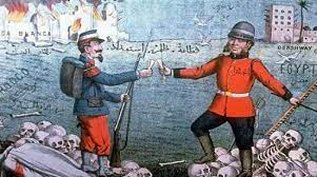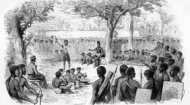however long it may take, to right some terrible
wrongs and restore Africa to the place where it belongs. A place we should be
proud to call home.
It is widely believed that Homo Sapiens evolved in Africa between 100,000 and
150,000 years ago. Around 40,000 years ago, for reasons unknown, man ventured
into and colonised what was to be to known as Europe. In truth we know very little of our African
history and ancestry until the rise of Egypt
around 3500 BCE. By then the desertification had turned the Sahara into sand,
separating northern African countries from those in the south, with the north
being populated and colonised by dynasties such as the Romans, with trade routes
across to the east flourishing and mixing with the indigenous peoples.
For over nine hundred years from the seventh to the sixteenth centuries,
Islam took a grip across the continent, particularly in the north, and
adventurers there seemed to stop at the edge of the great desert, with it not
being until 1487 that any European reached the furthest tip of South Africa. Soon after, Portuguese, followed by the English, Spanish, Dutch, French and
Danish set up trading outposts, keen to exploit the wonders of the continent.
Already domestic slavery was an accepted fact of life, just as it has been
throughout known African history.
Slaves were used to cultivate land, initially within Africa, but in 1619 this
changed when the Dutch started purchasing slaves to take to what is now the USA.
Soon thereafter, slavery became a major commercial venture and remained so for
well over a hundred years. That Africa was just a place for its riches and people to be harvested for
the betterment of western man was exemplified in the partition of Africa
towards the end of the nineteenth century.
The 'great' colonial powers simply
carved the continent up between them, without any regard for the wishes, rights
or boundaries of those who actually lived there. And so it remained, the personal fiefdom of Europe, except for Abyssinia and
Liberia, until the end of the Second World War, when, in return for USA aid,
Europe was forced to accept that its colonial days, in Africa at least, were
over, and a steady march towards a degree of freedom for those African countries
began. Of course some countries, such as Portugal, were reluctant to relinquish
their spoils, and a number of bitter wars were fought between the newly emerging
nations and their former 'masters.'
But as the west withdrew, they did not leave behind systems of government for
the population to take over, they left vacuums; vacuums that were soon filled by
many who had no experience of governing for the benefit of the many, so sought
to govern for the benefit of the few. This is our legacy to African history, conquest, exploitation and then abandonment and
so much of this even within the last fifty years or so. Today Africa suffers
from natural disasters such as famine, but its internal strife is as much the
creation of the west as its continuance is of failed internal governance. For hundreds of years, we exploited a continent and its people for our own
ends, disregarding and oblivious to the suffering, damage and pain we inflicted.
Today, we cannot simply walk away.
For recent African history is our legacy, and it is one that
we are duty bound to address. If sorry seems to be the hardest word, provide
support for this continents' children instead, and give them the health and
education to forge a better future for themselves and their own children as we
journey through this century.












